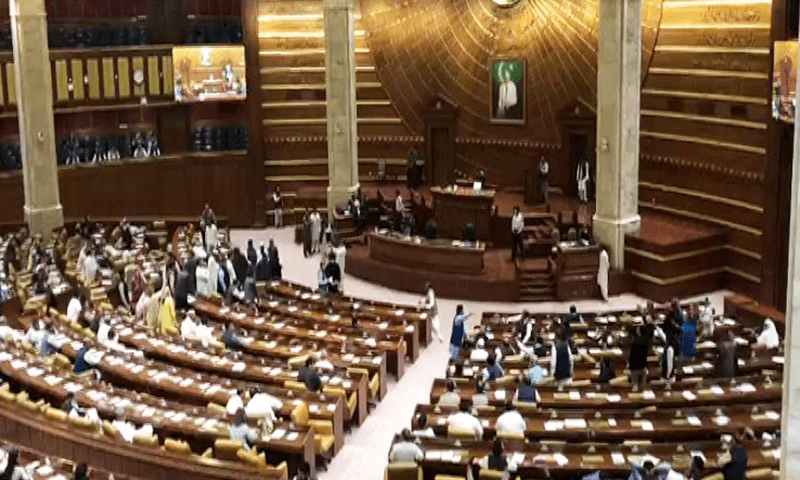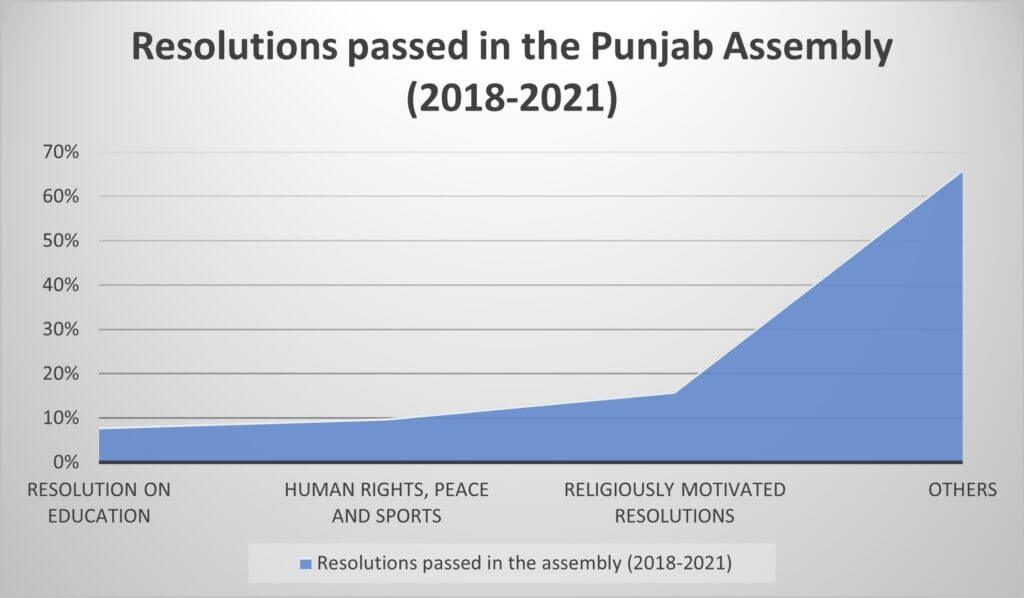
Punjab Assembly Resolutions on Education: A Performance Appraisal
A look into Punjab Assembly resolutions passed during the period 2018-2022 has revealed lawmakers expressing very little concern for the educational crisis in the province. The nature of these resolutions and the number of times an educational issue has been raised helped our IFE team indicate on Punjab Assembly’s performance appraisal. Information as found on the official website for Punjab Assembly depicted prevalence of religiously biased resolutions, which are partly responsible for dragging education down the path of its perpetual regression. We further explain our appraisal and criticism of the lawmakers’ efforts for education in the spaces below.
Why must Education become a Prime Concern?
Before we delve further into the scenario of political makes and breaks of the province prompted by a change of government at the center in April this year, it is crucial to understand that children and the youth are suffering today majorly due to a lack of consistent policy meant for their economic survival in future. The figures on education deprivations, such as out of school children, lack of infrastructure for schools, lack of teaching human resource, poor quality of textbooks, lack of mitigation strategy in light of calamities or pandemics, learning losses and poverty, are all out there glaring in our face, yet there is no political will expressed to address these. PSLM-2019-2020 data for the Punjab province shows that a 66% of the population has ever attended an educational institute, with the wider gaps observable among districts ( 11 out of 36 districts have a share of less than 55% of the population that ever attended a school in life). Among the literate, the population in the province that managed to complete primary school or higher stand at a meagre 56%. We are quoting these figures from the government’s own sources, but there is more to it; for the children who are in schools are not acquiring foundational numeracy and literacy skills. A World Bank report issued in 2019, titled “Is there a Learning Crisis in Punjab?” raised concern that “40% of boys and 29% girls are stuck in a low learning equilibrium from which they are unlikely to recover unless they receive basic numeracy and literacy instruction” . This report was prepared through SDI survey indicators applied in a sample of 812 public, private and PPP schools in 2018. The learning crisis, however, may have further deteriorated with the advent of the Pandemic and the climate crisis. With such low tendency for completing education, government in Punjab seems least bothered by the potential collapse of human capital market here in a few years, merely because our young population stand to lose workforce relevancy due to zero-skills acquisition during their formative years.
Instead of addressing concerns for our present and future generations, call to actions over irrelevant issues have been majorly expressed by our legislators through their resolutions.
Total resolutions passed between 19th August, 2018-21st December, 2021: 116
Resolutions on Education: 10 (we have not included religiously-motivated resolutions for education here)
Resolutions on Human Rights, Peace and Sports: 12 (three resolutions on toilet availability for rural populations, three on Kabaddi and sports, six on other human rights and minority issues)
Religiously motivated resolutions: 19 (10 of these resolutions are directed against Ahmadiyya community, five concern with condemnations for foreign countries over blasphemy, and four concern with education)
Others: 75 (issues such as condolences, renaming of institutions, condemnations for Indian and Israeli aggression, praise for armed forces, agriculture, waterways and road links)

Progressive Resolutions on Education
Below, we enlist progressive education resolutions in chronological order:
- On 26th February, 2019, MPA Hina Pervaiz Butt (PML-N) brought forward a resolution on prevention of drugs to protect children and youth and called for harsher penalties against the peddlers through an amendment in PPC laws.
- On 8th March, 2019, MPA Hina Pervaiz Butt (PML-N) presented a resolution to ensure and improve education access for girls and women as a way to their economic and social development (res-25)
- On 12th March, 2019, MPA Syeda Zahra Naqvi (PTI), presented a resolution on appropriate career counselling for children and youth as the subjects they choose are usually ill-informed, as a result of which their talents go wasted or unacknowledged. She also pointed out that a lack of proper counselling make their choices limited to only a few subjects which may lead to unwanted results. (res-26)
- On 24th December, 2019, MPA Musarrat Jamshed (PTI) presented a resolution of ensuring basic provision and educational access for children with special needs in order to mainstream. (res-43)
- On 21st July, 2020, MPA Sadia Suhail Rana (PTI) presented a resolution calling on the need to address mental wellbeing of students at schools and recommended for establishment of psychological centers at schools. (res-63)
- On 10th August, 2020, MPA and Chairperson Human Rights and Minority Affairs Committee Khalil Tahir Sindhu (PML-N) presented a resolution on World Minorities Day and called upon the house to ensure Quaid’s 11th August speech be made part of the curriculum (res-67)
- On 22nd December, 2020, MPA Sadia Suhail Rana (PTI), presented a resolution to call on the assembly to establish rules of business for Right to Education law which got promulgated in the province in 2014. (res-78)
- On 2nd March, 2021, MPA Shamim Aftab (PTI), presented a resolution to establish policy for Right to Education for children aged 5-16 years. (res-87)
- On 2nd March, 2020, MPA Chaudhry Iftikhar Hussain (PML-Jinnah), presented a resolution calling on the Assembly to address the issue of teachers’ stalled promotions under service rules devised in 2004 for BS 16. (res-88)
- On 28th September, 2021, MPA Khadija Omer (PML) presented a resolution calling on non-discrimination for transgender persons and to provide them equal opportunities in education and employment (res-103)
All of the resolutions enlisted above are a step in the right direction and depict sincerity of those who presented them, however, they are not adequate in addressing the pressing issues that surround education in their social, economic and human rights contexts. IFE believes that credit must be given to MPA Musarrat Jamshed (call to making provisions for children with special needs), MPA Hina Pervaiz Butt ( for presenting more resolutions on progressive education and peace among law makers) and MPA Syeda Zahida Naqvi (for bringing to light the issue of mismatched subject selection resulting in waste of talent in students). In Punjab, concerns for progressive education have been majorly expressed by women legislators, although two male legislators (MPA Chaudhry Iftikhar Hussain, and MPA Khalil Tahir Sindhu) are also worthy to be recognized for their concerns for education.
Regressive Resolutions on Education
As for education in political terms, aspects of education that have been touched upon in some resolutions are devoid of any progressive spirit. Out of the 19 religiously motivated resolutions mentioned above, IFE expresses deep concerns over the four resolutions that are directly linked with education. These are enlisted as follows:
- On 29th April, 2019, MPA Ammar Yasir (PML) presented a resolution calling to take action against textbook publishers over an alleged inclusion of “blasphemous material”. Furthermore, this resolution also criticized the police for taking action against individuals holding their anti-Ahmadiyya conference in Chiniot. Why is it dangerous? intimidation of educators or those in textbook publishing industry is a serious matter of concern. In a situation where incitement to violence, mob-vigilante actions are a common-place, we need to ensure protection of all against harm in our learning environments.
- On 26th June, 2020, MPA Muhammad Moaviya (Pakistan Rah e Haq) presented a resolution for appreciating the 2nd amendment in the Punjab Curriculum and Textbook Board, 2015 Act whereby textbooks (public and private) will undergo scrutiny and approval of the Muttahida Ulema Board; What makes it problematic? Religious scholars are not equipped with expert understanding of how subject knowledge should be provided to children. Giving them the authority for vetting books or banning them will result in getting Newton wear a “dupatta” in pictorial depictions. The amendment in the act was harmful, and the resolution has nothing to contribute to encourage scientific enquiry in children.
- On 26th June, 2020, MPA Neelam Hayat Malik (PTI) presented a resolution for making compulsory the writing of proper salutations (in Arabic) to holy names compulsory in all official texts, including in textbooks. Why is it concerning? This action might lead to more religious tensions and will take away the focus of our students, youth, officers etc. from their studies, economic development and social progress.
- On 22nd November, 2021, MPA Khadija Umer (PML) presented a resolution to ensure compulsory recitation of the Holy Quran and Durood Shareef before assembly period at all schools across the province. Why is repetitiveness concerning? The recitation of the Holy Quran is a normal practice in all schools and was not in need of more resolutions and notification. What was needed was a political will to make all schools inclusive and welcoming for students coming from diverse faith and religious groups.
What is missing?
We have enlisted both progressive and regressive resolutions on education presented during this period. While the implications education will have from the regressive mindset of the lawmakers are too obvious to tell, the calls for meaningful actions for an inclusive education remain negligible. For all the structural deprivations of learning in Punjab, we find many things amiss in the discourse presented to the Assembly by the law makers. Some of the major issues missing in our political discourse are as following:
- A call to ensure fundamental rights protection of teachers and pupils in all learning environments; and that includes keeping academics safe from harm and intimidation. A teacher and his/her pupils have a right to safe spaces of learning
- There are many observable instances of discrimination against students leading to their getting expelled from schools. A strong political resolve is needed to prohibit and criminalize the practice of denying access to education for anyone seeking it
- A need is there to make a demand for scientific and enquiry based education system. Also, no concern has ever been raised over the PCTB removing science as a subject for grades up to 3 from the scheme of studies
- There is also a need for the lawmakers to take up the issue of faltering foundational skills for numeracy and literacy among children and youth. Over two million children are out of school today, who soon will grow up to become part of the youth whose skills will have no relevance in the competing global economy and industry. An issue that cannot be left ignored for too long, because we are already too late in protecting Pakistan’s economic future
- Lawmakers also must also open up to the idea of education more appealing which can address the needs of diverse learning populations. Local contextualization for educational needs is more effective than a centralized one, which is the exact reason why the 18th amendment of the constitution must be upheld.



